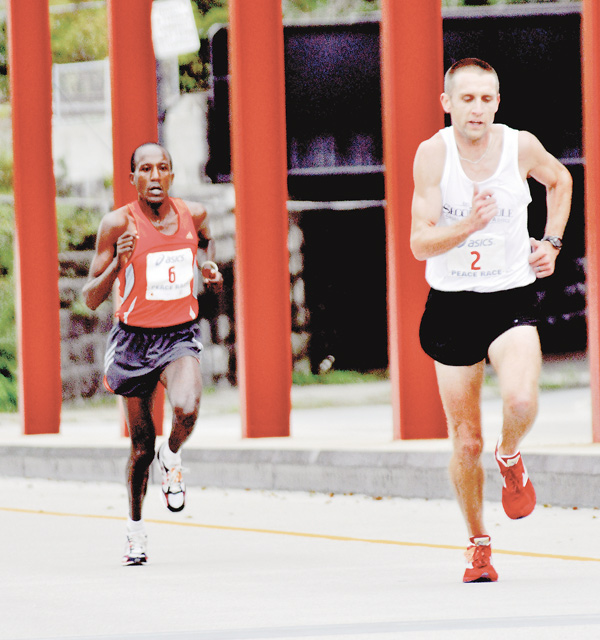Peace Race founder eyes change in payout system


Matt Folk, front, a resident of Oregon, Ohio, collected $1,000 as the 10K winner of the 2009 Peace Race, while Elijah Nyabuti walked away from the awards table without a $500 check as runner-up because of a rule in which international runners must win in the open race or masters categories or go home empty. It’s something race founder Jack Cessna wants addressed.
Forgive Jack Cessna’s sensitivity about the Youngstown Peace Race.
As founder of the event that originally began as the International Peace Race in 1975, Cessna sees some discrepancies that he’d like addressed.
But one longtime Peace Race director/board member says that adjustments in the payout system are as equitable as possible.
Cessna’s No. 1 beef is that the few international runners who are brought in must win either the men’s or women’s open race or the two open masters categories or go home empty.
“They’re used as rabbits,” Cessna said of the those who are usually the best runners. “If they finish second, they have to hitchhike back home,” he said with a hint of hyperbole.
Cessna, who now lives in Utica, N.Y., said he’d like to see the Peace Race organizers institute a separate prize fund for the internationals and eliminate the win-only clause.
“If they come in second, they go back penniless, while the third-, fourth- and fifth-place finishers receive money,” he said.
An example was in 2009, when Elijah Nyabuti of Kenya walked away from the awards table without a $500 check as runner-up.
Matt Folk, from Oregon, Ohio, collected $1,000 as the 10K winner in 29:20, while Nyabuti (29:29) was asked to provide proof of citizenship and proof of Ohio residency before he would be eligible for his monetary prize.
“If he can prove the residency, we’ll pay out,” Jenn Wohlgamuth, Peace Race president at the time, said after explaining the requirements, which were based on the 10k’s designation as the Ohio state championship through its Road Runners Club of America affiliation.
“They need proof of citizenship and proof of Ohio residency,” Wohlgamuth said after she told Nyabuti and his colleagues to submit the necessary papers via mail.
“The international runner has to be guaranteed to win or he wins nothing,” Cessna said.
But that system was re-worked after 2009 and, in their defense, the Peace Race board took necessary steps to satisfy both parties.
But consider 2008, when organizers reacted to what amounted to a slap in the face. That’s why they clamped down on the international payout.
That year, five Kenyans who were living in Kentucky won different categories and over 90 percent of the prize money.
“We got all kinds of complaints,” said Ted Rupe, who was race director for many years. “It was ridiculous and there was nothing for Americans and Ohio athletes. We’re trying to promote runners, but they took everything and then they didn’t even stay for the awards ceremonies. That turned people off. We decided that we’re going to work for a compromise and distribute the money in a little more equitable fashion.”
At the time, Peace Race officials had to walk a tight rope by inviting internationals to satisfy the world-class flavor, yet they had to be careful not to alienate their base support — all without going over budget.
Now, $5,500 of $10,000 in prize money is available to international runners — citizenship notwithstanding.
“That’s 55 percent of the prize money amount, while citizenship is required for the other $4,500,” Rupe said. “That’s a bit over half to non-citizens.”
Cessna, the first president of the Youngstown Roadrunners Club who is sometimes inclined to pit the past against the present, also questions the Peace Race website’s proclamation that “They [runners] come from all over the world.”
“If they want Ohioans to win, why are they saying they come from around the world?” he said. “Get more international runners or at least take ‘they come from around the world’ out of there.
“Three years ago, someone said that international runners come when they smell the money. Using that vernacular, there’s no prize money to smell.”
In the early years, distances were 25k and 10k.
Cessna said that the 1977 International Peace Race still stands as having the most runners to date: 1,987 paid runners followed by the next four races which attracted over 1,550 runners each. The 2011 race listed 1,047 10k entrants and 1,592 total.
“They should remove ‘Come from around the world’ from their website,” said Cessna, who stepped down from the Peace Race in 1992. “It should say they came from around the world.”
If there’s acrimony on one side or both, maybe it’s time to smoke the peace pipe.
 43
43
